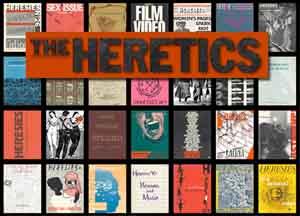The Heretics

The Heretics: Stories from a Feminist Collective premiered at New York’s Museum of Modern Art (MoMA) during the first two weeks of October, 2009. Written and directed by Hampshire college professor, Joan Braderman, the documentary chronicles the creation and life of the feminist art collective, the Heresies, and their homegrown publication, HERESIES: A Feminist Publication on Art and Politics, which was in print from 1977-1992.
Braderman circles the globe in search of her former colleagues—painters, writers, filmmakers, among other artists—in an effort to document the history of the Heresies Collective and their publication within the larger context of the feminist movement of the 1970s. Braderman is successful in capturing the spirit of the heretics through her many interviews. HERESIES was a seminal publication in and for the feminist movement, and, throughout the course of the film, each interviewer details the love and dedication poured into the publication, from all night meetings to open sessions for readers to critique the most recent issue.
As a contributor to this publication, which advocates the same spirit of global feminism of its precursor, I felt a kinship with the feminism embodied by the interviewees. Each interviewee emphasized the collective’s success in promoting feminism and feminist dialogue through the conduit of their journal. “Success” is a fraught word for feminists, who have worked for large-scale change, but for whom change has yet to come on an equivalent scale. Indeed, it was heartbreaking to hear various members of the collective lament the current state of feminism, particularly in the United States. They spoke of the fact that very few people are feminists, or even desire to appropriate the identity of feminist. These women, commonly known as the second wave feminists, along with women around the world, have dedicated their lives to achieving political and social equality for women—and yet, women today spit on both the appellation of “feminist” and the philosophy of feminism. The film therefore not only documents the past, but issues a challenge to the future: do you—you feminists, you women—dare to be heretical?